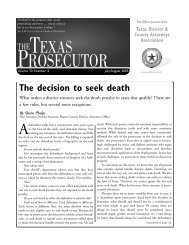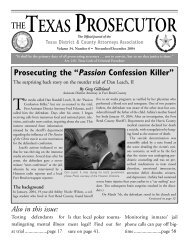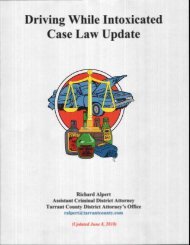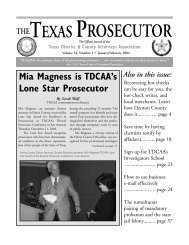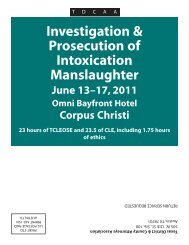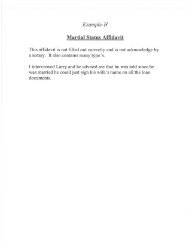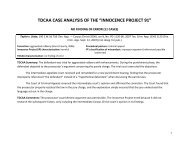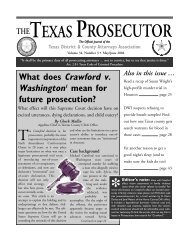Driving While Intoxicated Case Law Update - Texas District ...
Driving While Intoxicated Case Law Update - Texas District ...
Driving While Intoxicated Case Law Update - Texas District ...
You also want an ePaper? Increase the reach of your titles
YUMPU automatically turns print PDFs into web optimized ePapers that Google loves.
Sledqe v. State ,1994 WL 247961 (Tex.App.-Dallas June 9, 1994, no pet.[Not designated for<br />
publication).<br />
The defendant testified that he changed lanes but only because the lane ended, "played out." The<br />
Court of Appeals held that the defendant was not entitled to an article 38.23 instruction because he<br />
did not dispute the officer's testimony about his weaving but, instead, sought to explain the reason<br />
he drove that way. Id. The Court of Appeals concluded that the evidence did not raise a factissue<br />
about whether the officer stopped the defendant.<br />
Bellv. State, 2005 WL 503647 (Tex.App.-Fort Worth 2005, pet. ref'd)(mem. op., not designated<br />
for publication).<br />
The Court of Appeals upheld the trial court's denial of the defendant's request for an article 38.23<br />
instruction, noting that she did not contest the existence or nature of the evidence underlying the<br />
officer's decision to stop her. She merely challenged whether the circumsfances he obserued<br />
authorized the stop. Because only the effect of the underlying facts was disputed, the Court o.f<br />
Appeals held that the defendant was not entitled to an article 38.23 jury instruction.<br />
Beasley v. State, 810 S.W.2d 838, (Tex.App.-Fort Worth 1991 , pet. ref'd).<br />
Where the arresting officers and the defendant testified that she was swerving and weaving<br />
between lanes on the highway, and the only issue was that the defendant offered an explanation<br />
that she swerued because she was trying to stop her children from fighting, the court held she was<br />
not entitled to the article 38.23 instruction she requested.<br />
S. PER SE DEFINITION OPTION SHOULD BE SUBMITTED-LIMITING<br />
INSTRUCTION<br />
IMPROPER<br />
Kirsch v. State, 306 S.W.3d 738 (Tex.Crim.App. 2010).<br />
It Was proper for the Trial Court to instruct the jury that it could find the defendant gui$ under the<br />
per se impairment definition of intoxication, despite the absence of retrograde extrapolation<br />
evidence. The defendant's blood test showed that he had a BAC of 0.10 at the hospital, 80 minutes<br />
afer he was irwolved in the car wreck. The results are evidence from which a jury could find the<br />
defendant guilty under the per se impairment definition. Trial Court's instruction in prosecution for<br />
driving while intoxicated (DWI), that jury could consider defendant's blood alcohol content (BAC) test<br />
result "for the limited purpose of showing that the individualfesfed had ingested alcohol only at<br />
some point before the time of the test," was misleading and an improper comment on the weight of<br />
the evidence; BAC test resultwas also probative to show that defendantwas intoxicated atthe time<br />
he was driving, even though it was not sufficient by itself to prove intoxication at the time of driving.<br />
Wilfiams v. State, 307 S.W.3d 862 (Tex.App.-Fort Worth 2010, no pet.).<br />
Even though BAC was .07 ninety minutes after the defendant's arrest and there was no<br />
1,23



